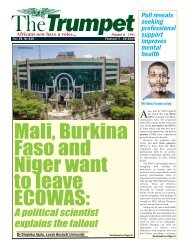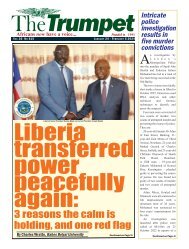The Trumpet Newspaper Issue 613 (December 27 2023 - January 9 2024)
The shameful truth about British colonial abuse in Kenya, and how it was covered up
The shameful truth about British colonial abuse in Kenya, and how it was covered up
Create successful ePaper yourself
Turn your PDF publications into a flip-book with our unique Google optimized e-Paper software.
<strong>The</strong><strong>Trumpet</strong><br />
Africans now have a voice... Founded in 1995<br />
V O L 29 N O <strong>613</strong> D E C E M B E R <strong>27</strong> <strong>2023</strong> - JANUARY 9 <strong>2024</strong><br />
Man jailed<br />
for 22<br />
counts<br />
of rape<br />
British soldiers search Kenyans suspected of being Mau Mau terrorists (Photo - Imperial War Museum CC BY-NC 4.0 Deed)<br />
Kenya at 60: the<br />
shameful truth<br />
about British<br />
colonial abuse<br />
and how it was<br />
covered up<br />
By Aoife Duffy, University of Essex<br />
Continued on Page 2><br />
Kevarnie Queen<br />
Following a hearing at Inner<br />
London Crown Court, a 19-<br />
year-old man has been<br />
sentenced to 12 years’<br />
imprisonment with an additional<br />
four years on licence.<br />
Kevarnie Queen of Brixton in<br />
south London – a predatory<br />
offender who raped teenage girls he<br />
met on social media was jailed after<br />
detectives supported victims to<br />
come forward and give evidence<br />
against him.<br />
He was previously convicted of<br />
22 counts of rape following a trial<br />
at the same court.<br />
Detective Constable Jennie<br />
Seward, one of the investigating<br />
officers, said: “<strong>The</strong> six women in<br />
this case – five of whom were aged<br />
just 15 at the time of the offences –<br />
have shown incredible bravery, not<br />
only in initially coming forward to<br />
police but in giving evidence at<br />
court which proved vital in bringing<br />
Queen to justice.<br />
“No-one who heard their<br />
personal statements can fail to be<br />
horrified by the impact Queen’s<br />
crimes have had on their lives, and<br />
we do not underestimate the effect<br />
this will have on them in the years<br />
to come.<br />
“<strong>The</strong>re is no doubt their actions<br />
will have prevented similar crimes<br />
against other women. We are<br />
pleased Queen is now behind bars<br />
and unable to cause any further<br />
harm.”<br />
Queen had met all but one of the<br />
six victims on social media where<br />
he groomed the girls before going<br />
on to rape them. He was just 15<br />
when he carried out the first offence<br />
in 2019. On many occasions, Queen<br />
manipulated his victims, making<br />
them think the sexual abuse was a<br />
normal part of being in a<br />
Continued on Page 5
Page2 <strong>The</strong><strong>Trumpet</strong> DECEMBER <strong>27</strong> <strong>2023</strong> - JANUARY 9 <strong>2024</strong><br />
News<br />
Kenya at 60: the shameful truth<br />
about British colonial abuse and<br />
how it was covered up<br />
Continued from Page 1<<br />
It is fairly well known that the lives<br />
of hundreds of thousands of<br />
Kenyans were affected by terrible<br />
acts of violence under the British<br />
colonial administration. <strong>The</strong> British<br />
government and King Charles have<br />
acknowledged it, and some victims of<br />
violence have taken the British<br />
government to court for these crimes.<br />
Less-known is how much the<br />
British imperialist government tried to<br />
cover up these violations.<br />
My research reveals how harsh<br />
British detention camps in Kenya were,<br />
and the extremes to which the<br />
colonialists went to conceal<br />
information about this.<br />
Much of this violence happened<br />
during the state of emergency, which<br />
lasted between 20 October 1952 and 12<br />
<strong>January</strong> 1960.<br />
As militant nationalism, including<br />
the Mau Mau rebellion, grew against<br />
the colonial state, a state of emergency<br />
was declared in 1952. It introduced a<br />
raft of extraordinary regulations, akin<br />
to wartime powers.<br />
<strong>The</strong> regulations paved the way for<br />
mass arrests, detention without trial,<br />
excess capital punishment, summary<br />
executions, evictions, fines and the<br />
forced resettlement of entire villages.<br />
From 1953 to 1960, between 70,000<br />
and 150,000 Mau Mau suspects were<br />
detained without trial in an archipelago<br />
of camps. Conditions in the camps<br />
were dire and British colonials and<br />
Solicitor and Partner<br />
of an award-winning<br />
law firm<br />
S.A.J<br />
LEGAL<br />
based in the heart of<br />
Central London -<br />
Kolade Jegede<br />
specializes in:<br />
Immigration - Preparing of all<br />
Immigration matters, including<br />
Appeal Challenges and Tribunal<br />
Representation.<br />
Employment - Handling all types<br />
of Employment Claims.<br />
Family Law - Dealing with Divorce<br />
Applications, Financial Arrangements,<br />
and Applying for Non-Molestation /<br />
Occupational Orders.<br />
First consultation is FREE.<br />
T: 07818 118656 E: kj@saj.legal<br />
4th (Uganda) Battalion King's African Rifles 1956-1957<br />
(Photo- Lieutenant Roger Perkins, National Army Museum)<br />
loyalist warders meted out violence<br />
with impunity.<br />
<strong>The</strong> Kenya Human Rights<br />
A home-made gun used by Mau Mau forces<br />
A home-made Mau Mau pistol<br />
Commission estimates that more than<br />
100,000 Kenyans were killed, tortured<br />
and maimed during this time.<br />
Using declassified colonial files and<br />
government papers, my research<br />
reveals the pressure that was exerted by<br />
the Colonial Office in London to<br />
conceal evidence of violence against<br />
detainees. It shows how a highly<br />
sophisticated propaganda machine<br />
controlled the public narrative of<br />
violent incidents.<br />
It was a form of state-sanctioned<br />
amnesia that hid the victims’<br />
perspectives. It officially depicted the<br />
British colonials as rational actors<br />
doing a difficult job under the<br />
circumstances.<br />
Highlighting this colonial story<br />
enriches the present and sheds new<br />
light on these events.<br />
Violence in detention<br />
I identified flash-points of violence<br />
which revealed the brutality of the<br />
colonial detention regime.<br />
One of these, known as screening,<br />
occurred when an entire village or<br />
community was confined and<br />
interrogated about their political<br />
allegiances. Many were subsequently<br />
detained.<br />
To progress through the camp<br />
complex to eventual release, detainees<br />
(none of whom had been charged with<br />
or convicted of any crime) had to<br />
confess to their Mau Mau activities.<br />
Camp staff achieved this by using<br />
systematic brutality that had been<br />
sanctioned by the colonial<br />
administration.<br />
One example was the “dilution”<br />
technique. This occurred when a small<br />
number of non-cooperating detainees<br />
were housed with cooperating<br />
detainees who – through a concerted<br />
psychological and physical attack –<br />
would push them to accept the<br />
rehabilitation regime and confess to<br />
taking the Mau Mau oath.<br />
A variation of this, the Mwea<br />
procedure, used physical force to break<br />
“hardcore” detainees when they first<br />
arrived at the detention camp.<br />
Incoming detainees would be abused<br />
by prison staff and cooperating<br />
detainees until they submitted.<br />
Another form of sanctioned<br />
violence was the use of “overpowering<br />
force”. This was supposed to be<br />
executed by European rehabilitation<br />
and prison staff in the form of on-thespot<br />
punishment of no more than 12<br />
strokes using a regulation cane.<br />
From 1953, a policy to compel<br />
detainees to engage in work was<br />
introduced and disobedience was<br />
redefined as a major offence. So when<br />
detainees refused to work, they were<br />
subject to corporal punishment.<br />
<strong>The</strong> scene was therefore set for the<br />
sanctioned use of violence against<br />
detainees. And if people were injured<br />
or killed in defiance of a legal order,<br />
those consequences could more easily<br />
be justified by camp authorities.<br />
<strong>The</strong>se methods of corporal<br />
punishment resulted in many injuries<br />
and deaths because camp staff<br />
regularly exceeded the punishment<br />
Continued on Page 3
News<br />
DECEMBER <strong>27</strong> <strong>2023</strong> - JANUARY 9 <strong>2024</strong><br />
<strong>The</strong><strong>Trumpet</strong><br />
Kenya at 60: the shameful truth<br />
about British colonial abuse and<br />
how it was covered up<br />
Page3<br />
Continued from Page 2<<br />
specified in emergency ordinances.<br />
For instance, on 3 March 1959 at<br />
Hola detention camp in the north<br />
province, 11 detainees were killed and<br />
many more injured after being set upon<br />
by guards for “refusing to work.”<br />
<strong>The</strong> initial official account blamed<br />
the deaths on contaminated water.<br />
However, the local inquest magistrate<br />
revealed the deaths “were due to shock<br />
and haemorrhage due to multiple<br />
bruising caused by violence.” Still, no<br />
one was ever prosecuted for these<br />
killings.<br />
Memory and history<br />
<strong>The</strong> history that is remembered is<br />
no accident. Writing to the Governor<br />
and the Colonial secretary in 1953,<br />
Kenya’s Attorney-General advised, “if<br />
we are going to sin, we must sin<br />
quietly”. Thus, a version of British<br />
imperialism was projected that relied<br />
upon concealment of harsh facts.<br />
<strong>The</strong> violent architecture of the<br />
Continued on Page 4
Page4<br />
<strong>The</strong><strong>Trumpet</strong><br />
<strong>The</strong><strong>Trumpet</strong> Group<br />
Field: 07956 385 604<br />
E-mail:<br />
info@the-trumpet.com<br />
<strong>The</strong><strong>Trumpet</strong>Team<br />
DECEMBER <strong>27</strong> <strong>2023</strong> - JANUARY 9 <strong>2024</strong><br />
News<br />
Kenya at 60: the shameful<br />
truth about British colonial<br />
abuse and how it was<br />
covered up<br />
Continued from Page 3<<br />
PUBLISHER / EDITOR-IN-CHIEF:<br />
’Femi Okutubo<br />
CONTRIBUTORS:<br />
Moji Idowu, Ayo Odumade,<br />
Steve Mulindwa<br />
SPECIAL PROJECTS:<br />
Odafe Atogun<br />
John-Brown Adegunsoye (Abuja)<br />
DESIGN:<br />
Xandydesigns@gmail.com<br />
ATLANTA BUREAU CHIEF:<br />
Uko-Bendi Udo<br />
3695 F Cascade Road #2140 Atlanta,<br />
GA 30331 USA<br />
Tel: +1 404 889 3<strong>613</strong><br />
E-mail: uudo1@hotmail.com<br />
BOARD OF CONSULTANTS<br />
CHAIRMAN:<br />
Pastor Kolade Adebayo-Oke<br />
MEMBERS:<br />
Tunde Ajasa-Alashe<br />
Allison Shoyombo, Peter Osuhon<br />
<strong>The</strong><strong>Trumpet</strong> (ISSN: 1477-3392)<br />
is published in London fortnightly<br />
THINKING<br />
OF<br />
WRITING<br />
A BUSINESS<br />
PLAN?<br />
We can help you develop a<br />
professional business plan<br />
from only £250.<br />
For more information, contact us<br />
at 0740<strong>27</strong>92146 or email us at:<br />
tolu.oyewole@consultant.com<br />
camps was hidden behind complicated<br />
bureaucratic language that stripped<br />
away its real meaning.<br />
<strong>The</strong> British public were spun a<br />
narrative by the colonial government<br />
about the “rehabilitative” nature of the<br />
camps – a way to convert people away<br />
from Mau Mau allegiance.<br />
In addition to spin, there was a<br />
deliberate attempt to suppress<br />
information. I was able to pinpoint<br />
significant Colonial Office directives<br />
from the late 1950s, which I argue were<br />
central to official denial and amnesia.<br />
As British colonial territories were<br />
inching toward independence in the<br />
mid-20th century, the government in<br />
Whitehall redoubled its efforts to bury<br />
any evidence that implicated its<br />
colonial officials in violations that<br />
occurred in territories under British<br />
administration.<br />
All top secret classified materials<br />
were rapidly centralised in executive<br />
offices in Kenya and marked for<br />
“European eyes only”.<br />
Certain colonial files were given a<br />
particular classification in a “Watch”<br />
series prior to Kenyan independence in<br />
1963. This included “all papers which<br />
might be interpreted as showing racial<br />
discrimination against Africans on the<br />
part of the Government”.<br />
<strong>The</strong> files were then either destroyed<br />
or removed to the UK in the 1960s. We<br />
know about the classification directives<br />
and destruction mandates because a<br />
paper trail covering those particular<br />
processes survived.<br />
It is clear from these directives that<br />
evidence of serious human rights<br />
abuses would be destroyed in these<br />
document purges. Documents deemed<br />
to be safe were transferred to the new<br />
independent government.<br />
All of these acts meant that the<br />
colonial portrayal of the Mau Mau<br />
uprising as irrational could be<br />
Weapons of the Mau Mau included clubs, knives, spears and arrows<br />
Mau Mau Stone Age Cave in Kiambu, Kenya (Photo - Ishaku Mshelia, CCA 4.0 SA Int)<br />
legitimised.<br />
Selectivity over what could be<br />
mentioned was a successful colonial<br />
strategy, with resonance in how British<br />
colonial history is viewed today.<br />
Apology and reparations<br />
Those who continue to benefit from<br />
Britain’s historical violence are<br />
insensitive or unresponsive to the calls<br />
for acknowledgement, apology and<br />
reparations.<br />
Public statements by King Charles<br />
and former British foreign secretary<br />
William Hague recognise that Kenyans<br />
were subjected to torture and illtreatment<br />
at the hands of the colonial<br />
administration, but they fall short of a<br />
full apology.<br />
<strong>The</strong>re will be difficulty in<br />
examining and addressing historical<br />
harms. But my research reveals a need<br />
to reconcile the colonial narratives with<br />
historical facts. This holds the potential<br />
to foster genuine compassion and<br />
justice.<br />
• Aoife Duffy is a Senior Lecturer at<br />
University of Essex.<br />
• This article is republished from <strong>The</strong><br />
Conversation under a Creative<br />
Commons license. Read the<br />
original article.
Hair & Beauty<br />
DECEMBER <strong>27</strong> <strong>2023</strong> - JANUARY 9 <strong>2024</strong><br />
<strong>The</strong><strong>Trumpet</strong><br />
Vatika Naturals launches new<br />
curly hair range at Christmas gala<br />
Page5<br />
Amidst festive splendour, Vatika<br />
unveiled its Christmas<br />
extravaganza - ‘A Tress’Mas<br />
Affair’, setting ablaze the town with an<br />
unforgettable celebration! This Christmas<br />
celebration brought together influencers<br />
from diverse realms – makeup, hair care,<br />
travel, wellness, and more – all under one<br />
roof for an evening that celebrated beauty<br />
of all types - the very pillar of Vatika. <strong>The</strong><br />
heart of the affair was illuminated by the<br />
theme #GreenForRed, an ode to Vatika’s<br />
use of the essence of Natural Ingredients.<br />
<strong>The</strong> evening opened with an aura of<br />
excitement as Roshni Singh, the Group<br />
Marketing Manager of Dabur<br />
International, took the stage. Her speech<br />
heralded the grand unveiling of Vatika’s<br />
new range for curly hair. <strong>The</strong> spotlight<br />
then shifted to the celebrity hair care<br />
expert who expertly unravelled the<br />
mysteries of diverse hair types,<br />
enlightening the audience with<br />
personalised tips and tailored Vatika hair<br />
care routines. <strong>The</strong> hair care specialist<br />
dwelled on the profound link between<br />
inner well-being and hair vibrancy,<br />
stressing the impact of nutrition and<br />
mental serenity on hair health. Expanding<br />
beyond it, she shed light on external<br />
factors like climate and product choices,<br />
key players influencing hair appearance.<br />
At the heart of it all was Vatika’s unique<br />
ethos - rather than dictating norms, the<br />
brand passionately adapts to meet diverse<br />
hair care needs, emphasizing a<br />
personalized approach that evolves<br />
alongside its users, empowering them on<br />
their distinct hair care journeys.<br />
An engaging Q&A session ensued,<br />
leaving influencers armed with insights<br />
for nourished hair and personalised<br />
Vatika hair care routines for their unique<br />
hair type.<br />
With sparkling drinks, delicious food<br />
and tantalising tarot card readings taking<br />
place, the event was buzzing with<br />
excitement. <strong>The</strong> true star of the evening<br />
was the life-size advent calendar – a<br />
‘Rudolph’ in its own right – adorned with<br />
an array of Vatika hair care treasures.<br />
From indulgent hair oils, revitalising<br />
shampoos, and luxurious conditioners to<br />
masks and temporary hair colours,<br />
influencers were spoilt for choice,<br />
curating their personalised Vatika<br />
selection to take home.<br />
Amidst merry tunes and jubilant<br />
spirits, a karaoke bar set the rhythm,<br />
coaxing everyone into a joyous dance of<br />
Christmas cheer. However, the pinnacle<br />
of the night was the Christmas tree,<br />
lovingly adorned by influencers with<br />
their favourite Vatika baubles, igniting<br />
the season’s festive fervour.<br />
Zakir Mansoori, the Business Head at<br />
Dabur International UK, shared his<br />
thoughts about the event, stating, “<strong>The</strong><br />
Tress’Mas Affair along with launching a<br />
new hair care range for curly hair<br />
epitomized all that Vatika truly represents<br />
- the essence of natural ingredients found<br />
in our hair care, along with the<br />
celebration of diverse hair types. <strong>The</strong><br />
event was just the perfect Christmas gift<br />
wrapped up with warmth, love, and hair<br />
care galore. Here’s to many more<br />
splendid events that honour our ethos and<br />
bring us together for such delightful<br />
evenings.”<br />
Continued on Page 8<<br />
Man jailed for 22 counts of rape<br />
Continued from Page 1<<br />
relationship.<br />
On 7 June 2022, Queen was arrested<br />
on suspicion of rape after a report was<br />
made to police. This was not the first<br />
time that allegations had been made<br />
around Queen but it was only on this<br />
occasion that the victim had wanted to<br />
support a criminal investigation.<br />
Detectives went back to those they<br />
believed may have previously been<br />
victims, who then agreed to support the<br />
criminal case.<br />
<strong>The</strong> investigation included hundreds<br />
of hours analysing communications<br />
between Queen and the victims,<br />
providing an insight into how he treated<br />
them as well as his general lack of<br />
respect towards women.<br />
Multiple witness statements<br />
obtained from friends, family members<br />
and various third parties helped<br />
demonstrate the impact the offences<br />
had on the victims both at the time and<br />
now, years later.<br />
During the criminal process, each of<br />
the victims was assigned a specially<br />
trained officer to be their point of<br />
contact throughout the investigation<br />
and during the trial. This officer was<br />
responsible for keeping them up to date<br />
with the progress of the investigation,<br />
answering any questions they had, and<br />
making referrals to support agencies.<br />
<strong>The</strong>y were also offered special<br />
measures for the trial, such as prerecording<br />
their evidence, or giving<br />
evidence via live link or from behind a<br />
screen, to enable them to feel as<br />
comfortable as possible throughout the<br />
court proceedings.<br />
Detective Constable Lena Kraemer,<br />
who also worked on the investigation<br />
said: “We are doing everything we can<br />
to ensure that sexual predators who<br />
make our streets unsafe for women and<br />
girls are placed before the courts. We<br />
can’t do that alone. If you have been the<br />
victim of a sexual offence and have not<br />
yet spoken to police, we urge you to do<br />
so; at the very least so we can ensure<br />
that you are being supported.<br />
“We understand that supporting a<br />
police investigation for sexual assault<br />
is a daunting prospect but with police<br />
and professional support we can ensure<br />
your voice is heard.<br />
“If you have any information about<br />
sexual predators please inform police<br />
directly or anonymously via the<br />
independent charity Crimestoppers.<br />
This all helps us build a picture to<br />
prevent and detect crime.”
Page6 <strong>The</strong><strong>Trumpet</strong> DECEMBER <strong>27</strong> <strong>2023</strong> - JANUARY 9 <strong>2024</strong>
DECEMBER <strong>27</strong> <strong>2023</strong> - JANUARY 9 <strong>2024</strong> <strong>The</strong><strong>Trumpet</strong><br />
Page7
Page8 <strong>The</strong><strong>Trumpet</strong> DECEMBER <strong>27</strong> <strong>2023</strong> - JANUARY 9 <strong>2024</strong><br />
Hair<br />
& Beauty<br />
Vatika Naturals launches new<br />
curly hair range at Christmas gala<br />
Continued from Page 5<<br />
Vatika ingeniously joined the holiday<br />
festivities, swapping the traditional red<br />
for Vatika’s iconic green, a nod to their<br />
commitment to harnessing natural<br />
ingredients. This vibrant hue echoed their<br />
philosophy, ensuring top-notch quality<br />
for their consumers through the essence<br />
of natural ingredients in their products.<br />
Amidst delectable treats, effervescent<br />
conversations, and an air infused with the<br />
spirit of giving, ‘A Tress’Mas Affair’<br />
became a cherished memory for all who<br />
were part of the celebration.<br />
Vatika - Dabur’s subsidiary, has<br />
garnered a strong reputation for its<br />
commitment to harnessing the power of<br />
natural ingredients in their hair care<br />
products. It draws upon time-tested<br />
natural ingredients such as Coconut,<br />
Olive, Almond, Garlic, Black Seeds, and<br />
other natural extracts known for their<br />
nourishing properties. Beyond shampoos,<br />
conditioners, and oils, Vatika offers a<br />
comprehensive range of hair care<br />
products tailored for various needs,<br />
including hair masks, styling creams, and<br />
hair colours. <strong>The</strong>se products address<br />
issues like hair damage, dryness, frizz,<br />
and promoting hair health.
Opinion<br />
Dilemma of unending<br />
promises in democracy<br />
DECEMBER <strong>27</strong> <strong>2023</strong> - JANUARY 9 <strong>2024</strong><br />
<strong>The</strong><strong>Trumpet</strong><br />
Page9<br />
It is a glorious thing to have a<br />
tested leader as the President of<br />
a country. It is also a blessing<br />
when the President means what he<br />
says and when what he says is not<br />
just believable but also approved by<br />
the people. Such a society is bound<br />
to swim in an environment of<br />
enormous possibilities because the<br />
question of trust is taken care of.<br />
<strong>The</strong> question of purpose is also<br />
sorted. Be that as it may, it is a twoedged<br />
sword: the leader will have to<br />
be conscious of time and calculative<br />
of his achievements while the mass<br />
of the people must remain critical in<br />
terms of the goals and objectives of<br />
the government.<br />
As for the people, that’s what<br />
will give them the leverage in terms<br />
of the measurement of performance<br />
of the critical goals and objectives<br />
of the government. As for the<br />
government, to achieve its goal, no<br />
Ministry is sacrosanct; no policy is a<br />
no-go area. In other words, there<br />
should be no sacred cows. So, a<br />
leader worth his designation must be<br />
exceptionally bold.<br />
Promises are good when they are<br />
implemented. <strong>The</strong>y create an<br />
atmosphere of trust and a political<br />
capital that is difficult to deplete.<br />
But when promises are made but<br />
broken, they deplete the political<br />
capital faster than a bullet. It is like<br />
thunder and lightning.<br />
Integrity also wanes. <strong>The</strong> more<br />
the believability of a gladiator<br />
wanes, the faster the credibility and<br />
the ability to win elections fly away.<br />
If one tells the people something<br />
and that thing wanes, so is a certain<br />
percentage of one’s political capital<br />
waning. <strong>The</strong> more reason a leader<br />
has to guide the currency of his or<br />
her promises, because nobody wants<br />
to trade with a currency that’s under<br />
suspicion. In other words, once it<br />
gets to a point where the people are<br />
no longer eager to listen to their<br />
leader’s voice, trouble looms.<br />
It is no longer news that<br />
President Bola Tinubu has promised<br />
to let the poor breathe! He has<br />
promised to banish poverty! He has<br />
also promised to fight insecurity to a<br />
standstill! As a matter of fact,<br />
Nigerians have lost count of the<br />
promises made by this<br />
administration since May 29. Early<br />
this week, Tinubu vowed that no<br />
student would drop out of school on<br />
his watch! <strong>The</strong> point is: Nigerians<br />
are tired of unending promises from<br />
their leaders. In the 80s, Nigerians<br />
were promised houses, stable power<br />
supply, affordable and qualitative<br />
education and ‘everything for all’ by<br />
the Year 2020. This is <strong>2023</strong> and …<br />
here we are! So, Tinubu needs to<br />
prove to the world that he is<br />
different from the abnormal norms.<br />
Bola Ahmed Tinubu<br />
He should learn, especially from our<br />
recent past, because examples of<br />
people who started well but ended<br />
badly abound.<br />
Successive governments have<br />
taught Nigerians how to get weary<br />
of unending promises. It’s a bad<br />
experience which they don’t want to<br />
relive. On May 29, 2015,<br />
Muhammadu Buhari assumed office<br />
as Nigeria’s President. Buhari came<br />
into office standing on a tripod:<br />
security, fight against corruption and<br />
infrastructure development and job<br />
creation. By the time he was leaving<br />
office on May 28, <strong>2023</strong>, life in<br />
Nigeria as a Nigerian had become<br />
extremely hard. So, only God can<br />
rate the former President’s<br />
performance and thank him on<br />
behalf of Nigerians. For instance,<br />
BY ABIODUN<br />
KOMOLAFE<br />
Buhari had promised to recover<br />
every Chibok girl captured by Boko<br />
Haram. He had also promised to<br />
lead Nigeria ‘from the front.’ But<br />
that’s what they were: unfulfilled<br />
promises. Mention the economy<br />
under Buhari and Nigerians would<br />
be quick to recount how he acted<br />
King Rehoboam.<br />
On the war against corruption,<br />
some of those who were around<br />
between <strong>December</strong> 31, 1983 and<br />
August <strong>27</strong>, 1985 would have by<br />
now concluded that those who<br />
impishly said that Nigerians were<br />
being ruled by one funny ‘Jibrin<br />
from Sudan’ might not have been<br />
sincerely wrong. So, when Femi<br />
Adesina said that his principal<br />
fulfilled all his promises to<br />
Nigerians, one could not but marvel<br />
at the height of insult on the<br />
collective intelligence of Nigerians.<br />
‘If the foundation be destroyed<br />
…?’ <strong>The</strong> problem with Nigeria has<br />
been a dearth of forthright and<br />
insightful leaders; and that’s why<br />
dear country has been in this sorry<br />
pass. <strong>The</strong> late Obafemi Awolowo<br />
was too elitist in his time; and he<br />
ended up being sandwiched by antielitist<br />
elements! It was a serious<br />
issue but, even at that, Awolowo did<br />
some things which clearly<br />
distinguished him as a forthright<br />
leader. For example, when the then<br />
University of Ife was to be<br />
established, the Ikenne-Remo-born<br />
politician resolved to make it the<br />
best university on this part of the<br />
planet. To achieve this, he ordered<br />
the hiring of the best brains from<br />
across the globe, even if it would<br />
cost the Western Region a<br />
substantial amount of resources.<br />
Continued on Page 10
Page10 <strong>The</strong><strong>Trumpet</strong> DECEMBER <strong>27</strong> <strong>2023</strong> - JANUARY 9 <strong>2024</strong><br />
Wole Olanipekun<br />
at 72!<br />
By Abiodun Komolafe<br />
Chief Wole Olanipekun<br />
Opinion<br />
Dilemma of<br />
unending<br />
promises in<br />
democracy<br />
Glory be to God, Chief<br />
Oluwole Oladapo<br />
Olanipekun is two years<br />
above seventy!<br />
It is not due to his power or<br />
ability to plead cases in the court<br />
of law. It is purely the grace of the<br />
Strength of Israel.<br />
For decades, Olanipekun has<br />
been an amiable Watcher at the<br />
Bench. This personable individual,<br />
humanist extraordinaire and an<br />
indefatigable and undefeatable<br />
iconic silk has now carved a niche<br />
for himself in high-profile clientele<br />
by handling public political<br />
disputes.<br />
Unknown to him, the Senior<br />
Advocate of Nigeria (SAN) is a<br />
mentor to many people. Many<br />
Nigerians are looking up to him<br />
and are watching. So, history is<br />
recording whatever he says and<br />
how he weighs matters; and that<br />
will be his legacy, not what friends<br />
and other men-pleasers say.<br />
Olanipekun is no longer an<br />
ordinary man. He has paid his dues<br />
and God has placed him on a<br />
pedestal that is rare. Nigerians can<br />
only wish him well and have him<br />
around us for many years to come.<br />
Continued from Page 9<<br />
Reports had it that it was Awolowo<br />
who personally looked for Professor<br />
Hezekiah Oluwasanmi as the<br />
university’s pioneer Vice<br />
Chancellor. Decades after its<br />
establishment, the institution, now<br />
rechristened Obafemi Awolowo<br />
University (OAU), still retains even<br />
its powerful aesthetic appeal.<br />
Tinubu as an individual is<br />
determined and he’s working. But<br />
where are the Ministers? Where are<br />
the Ministers of Agriculture and<br />
Power for instance? <strong>The</strong> Minister of<br />
Power, Adebayo Adelabu, has not<br />
uttered a word or made a policy<br />
statement since his inauguration. On<br />
his part, the Minister of Agriculture<br />
and Food Security, Abubakar Kyari<br />
has refused to take advantage of the<br />
low-hanging fruits that the sector<br />
presents, both in terms of the<br />
massive food production advocacy<br />
and provision of employment<br />
opportunities to mitigate the stress<br />
on the economy. In fact, what is<br />
only known about ‘Penkelemesi’ is<br />
his running upandan, crisscrossing<br />
between Ibadan and Abuja; and it’s<br />
as if his destiny depends solely on<br />
the Governorship seat of Oyo State,<br />
come 20<strong>27</strong>.<br />
Without doubt, too many<br />
promises are a panacea for loss of<br />
focus. <strong>The</strong>refore, Tinubu should let<br />
Nigerians know which among his<br />
promises are achievable before this<br />
first term expires. For instance, if he<br />
is going to provide electricity, let it<br />
be that Tinubu has said that<br />
electricity is his main focus. In any<br />
case, two terms of eight years can’t<br />
even be enough to resolve the many<br />
challenges bedeviling the sector.<br />
But at the end of the day, Nigerians<br />
won’t have to go back to it again.<br />
<strong>The</strong> State of Israel once started as<br />
a subdued nation. But she went back<br />
to the drawing board to recalibrate<br />
the reasons for her existence. Now,<br />
woe betide any nation that thinks<br />
little of Eretz Yisrael. Even the<br />
United States of America takes<br />
Israel into consideration before<br />
taking any steps. So, wither Nigeria,<br />
the ‘Giant of Africa’?<br />
May the Lamb of God, who<br />
takes away the sin of the world,<br />
grant us peace in Nigeria!<br />
Komolafe wrote in from Ijebu-<br />
Jesa, Osun State, Nigeria<br />
(ijebujesa@yahoo.co.uk;<br />
08098514418 – SMS only)<br />
STALLIONS AIR<br />
Ipanema Travel Ltd<br />
AFRICA FLIGHTS<br />
SPECIALISTS<br />
LAGOS fr £477<br />
(2 Bags)<br />
020 7580 5999<br />
07979 861 455<br />
Call AMIT / ALEX<br />
73 WELLS ST, W1T 3QG<br />
All Fares Seasonal<br />
ATOL 9179<br />
It pays to Advertise in<br />
<strong>The</strong> <strong>Trumpet</strong> Call<br />
020 8522 6600 or<br />
email: adverts@thetrumpet.com
DECEMBER <strong>27</strong> <strong>2023</strong> - JANUARY 9 <strong>2024</strong> <strong>The</strong><strong>Trumpet</strong><br />
Page11
Page12 <strong>The</strong><strong>Trumpet</strong> DECEMBER <strong>27</strong> <strong>2023</strong> - JANUARY 9 <strong>2024</strong><br />
<strong>The</strong>Trump et<br />
Africans now have a voice... Founded in 1995<br />
SUBSCRIBE to the authentic newspaper<br />
focusing on Africa and Friends of Africa.<br />
<strong>The</strong> <strong>Trumpet</strong> <strong>Newspaper</strong> which was<br />
established in 1995 has over the years grown<br />
to be the <strong>Newspaper</strong> of choice and voice for<br />
Diaspora Africans.<br />
It also has a readership among Africans on<br />
the Continent who want to connect and<br />
keep up with Diaspora Africans; and Friends<br />
of Africa who want to connect and keep up<br />
with Africa.<br />
We are pleased to offer more choices to read<br />
<strong>Trumpet</strong> <strong>Newspaper</strong> via Subscription to our<br />
Digital edition or Print edition (or both).<br />
As a paid Subscriber, you will enjoy:<br />
• Priority and Direct delivery of every<br />
fortnightly issue to you (Digital - via email<br />
and Print via Post).<br />
• Occasional exclusive offers and event<br />
invitations (subject to availability).<br />
Our Subscription Rates vary according to<br />
where you are in the world: UK, Europe<br />
or Rest of the World.<br />
You can Subscribe online at:<br />
<strong>Trumpet</strong>MediaGroup.com/Shop<br />
or complete the form below.<br />
I / We wish to subscribe to<br />
<strong>Trumpet</strong> <strong>Newspaper</strong> until further notice:<br />
Name:<br />
Rates and options ( Tick ✔)<br />
Address:<br />
Email:<br />
Tel No:<br />
I/We made a payment of £ on (date) into<br />
your Bank Account: Account Name: Target Today Ltd.<br />
Sort Code: 20 32 00<br />
Account No: 03946231<br />
I am / We are enclosing cheque for £<br />
Target Today Ltd.<br />
made payable to<br />
Signature:<br />
I / We have sent a payment of £<br />
targettoday@the-trumpet.com<br />
via Paypal to<br />
Date:<br />
Please send me a Stripe Payment Link<br />
Return Subscription Form by Email: info@the-trumpet.com<br />
or Post: <strong>Trumpet</strong> Media, 3rd Floor, 86 - 90 Paul Street, London EC2A 4NE
DECEMBER <strong>27</strong> <strong>2023</strong> - JANUARY 9 <strong>2024</strong> <strong>The</strong><strong>Trumpet</strong><br />
Page13
Page14 <strong>The</strong><strong>Trumpet</strong> DECEMBER <strong>27</strong> <strong>2023</strong> - JANUARY 9 <strong>2024</strong><br />
Opinion<br />
Surviving Nigeria’s Pan-<br />
Fulani President with<br />
Sunday Igboho<br />
After a house detention spanning<br />
two years, Nigeria’s Sunday<br />
Igboho recently finally secured<br />
his freedom from Benin Republic. He<br />
did not return to Nigeria. He jetted out to<br />
Germany.<br />
Igboho, 56, a Yoruba nation<br />
separatist and whose real name is Chief<br />
Sunday Adeyemo, ran afoul of that<br />
Francophone nation’s laws for<br />
attempting to secure its passport through<br />
the backdoor. <strong>The</strong>y arrested him.<br />
Worldwide pleas by Yoruba people were<br />
Muhammadu Buhari<br />
made for his release, with even the<br />
Nobel Laureate, Professor Wole<br />
Soyinka, paying Igboho a visit in<br />
custody May 2022. Perhaps reluctant to<br />
court the ire of President Muhammadu<br />
Buhari, Cotonou had dilly-dallied over<br />
Igboho’s case until the Fulani-born<br />
retired-Army General’s tenure expired<br />
on May 29.<br />
Igboho became a fugitive from<br />
Nigeria after the Department of State<br />
Services (DSS) raided his Ibadan, Oyo<br />
State home. This followed his effrontery<br />
in issuing a deadline to almighty Fulani<br />
herdsmen who for years had unleashed<br />
an orgy of kidnapping, murder and rape<br />
on rural communities in Sunday’s native<br />
Yoruba South-West. <strong>The</strong> Fulani pseudomonarch,<br />
Seriki Fulani, served as<br />
intermediating agent for ransom<br />
payment to the kidnappers, who slew<br />
several captives and frightened farmers<br />
away from farmlands. SOS cries to<br />
security agents went unheeded. Finally,<br />
Igboho led natives on a raid of the camp<br />
of this Fulani army of occupation in<br />
Igbo-Ora, Igangan, Ibarapa and environs<br />
in Oyo State.<br />
Reprisal came from an unexpected<br />
quarter. Clearly acting under the<br />
instructions of <strong>The</strong> Presidency and the<br />
agency’s Fulani-born CEO Yusuf<br />
Magaji Bichi, DSS operatives stormed<br />
Sunday Igboho’s home in a midnight<br />
invasion on July 1, 2021, unleashing<br />
sorrows, tears and blood in a rain of<br />
bullets. DSS slaughtered two unarmed<br />
occupants and arrested 12. <strong>The</strong> Yoruba<br />
activist himself escaped. Government<br />
froze all his bank accounts. While<br />
attempting to reach Europe through the<br />
West African country, Igboho fell into<br />
the hands of the gendarmes when he<br />
tried to arrange travel documents<br />
informally. Abuja mounted pressure for<br />
his repatriation back home. However,<br />
Buhari and his Fulani collaborators<br />
underestimated the centuries-old sociocultural<br />
ties between Benin Republic<br />
Yoruba and Nigerian Yoruba. Those ties<br />
saved Adeyemo.<br />
What offence did Igboho commit,<br />
except confront foreign Fulani killing<br />
Nigerians? <strong>The</strong> story began with the<br />
house-rat inviting the bush-rat to come<br />
and partake in the abundant food<br />
available at home. Perhaps because of<br />
climate change and shrinking grazing<br />
grounds in the Savannah, Fulani<br />
cowboys zeroed in on Middle-Belt and<br />
Southern Nigeria’s lush greenery.<br />
Buhari, a pan-Fulani bigot being in<br />
power, Fulani irredentism won. He<br />
threw the borders open. Unchecked, the<br />
itinerant herders arrived here in droves<br />
from all over Africa and filtered through<br />
the land. <strong>The</strong>y came with their AK47s,<br />
anti-aircraft propelled rocket launchers<br />
and unleashed a new brand of terrorism.<br />
Migrant Fulani militias unleashed terror<br />
everywhere the soles of their feet<br />
marched. <strong>The</strong>y still do. Videos have<br />
been seen of helicopters landing in thick<br />
forests to supply these militias with<br />
arms and provisions. This was Statebacked<br />
terrorism.<br />
Like the helplessness they displayed<br />
in Igboho’s neck of the wood in Ibarapa,<br />
security agencies made zero or halfhearted<br />
efforts to halt the Fulani<br />
militants’ evil activities nationwide. <strong>The</strong><br />
world termed them the second deadliest<br />
terror group in the world, but pro-Fulani<br />
Buhari’s regime held back. His<br />
government sold the official false<br />
narrative that herdsmen killing unarmed<br />
rural dwellers arose from axiomatic<br />
farmers-herdsmen clashes. Such<br />
rhetoric served as white-washing PR, if<br />
not justification, for the killings, even as<br />
their body counts mounted nationwide.<br />
Buhari’s government consistently sided<br />
with the foreign aggressors.<br />
It will not be forgotten, the ignoble<br />
role of Buhari’s spin-doctors and attack<br />
dogs: Femi Adesina, Garba Shehu and<br />
Lai Mohammed. Such names will go<br />
down in infamy as defenders of killer<br />
Fulani. Adesina once said those who<br />
failed to give up land to the Fulani<br />
should prepare to forfeit their lives -<br />
undoubtedly his pan-Fulani paymaster,<br />
Buhari’s veritable voice.<br />
Buhari came from a Fulani father<br />
BY FELIX<br />
OBOAGWINA<br />
and a half-Kanuri-half-Hausa mother.<br />
He hails from the Fulani stock in Daura,<br />
Katsina State. Also called Fulbe, the<br />
Fulani tribe originated from nomads in<br />
North Africa and sub-Saharan Africa,<br />
settling into Central and West Africa.<br />
Upon landing on Nigerian soil, and in<br />
order to secure population and<br />
numerical advantage, the Fulani heads<br />
formed a socio-political alliance with<br />
their Hausa hosts; and today, they are<br />
jointly tagged Hausa-Fulani. But when<br />
push comes to shove and competition<br />
for posts and resources becomes<br />
inevitable, Hausa and Fulani individuals<br />
resort to their separate ancient tents.<br />
Despite being less than 9 percent of<br />
Nigeria’s population, the Fulani wield<br />
much socio-political and socio-cultural<br />
superiority.<br />
In relationship to other Nigerians,<br />
Buhari and fellow Fulani irredentists<br />
rate their foreign cousins higher.<br />
Nigerian Fulani’s affinity with cousins<br />
from Mali, Niger, Chad, Cameroun,<br />
Guinea-Bissau and Libya gives these<br />
invaders licence to infiltrate the<br />
Nigerian space.<br />
Going by narratives from APC<br />
chieftains privy to the affair, foreign<br />
Fulani militants had been recruited to<br />
push Buhari into power in 2015.<br />
President Goodluck Jonathan saw the<br />
handwriting on the wall and quickly<br />
threw in the towel to prevent a<br />
bloodbath. <strong>The</strong> APC kingpins claimed<br />
that politicians reneged on agreements<br />
with the imported militants, which<br />
infuriated them and made them go wild.<br />
However, something else fuelled the<br />
foreigners’ daredevilry - a pan-Fulani<br />
agenda.<br />
In his eight years, President Buhari<br />
powered that pan-Fulani agenda. <strong>The</strong><br />
agenda drove his lopsided pro-Fulani<br />
appointments, especially in security and<br />
the entire Armed Forces. <strong>The</strong> agenda<br />
theoretically centred on rallying Fulani<br />
in Africa to migrate to Nigeria and<br />
Continued on Page 15>
Opinion<br />
DECEMBER <strong>27</strong> <strong>2023</strong> - JANUARY 9 <strong>2024</strong><br />
Surviving Nigeria’s Pan-Fulani<br />
President with Sunday Igboho<br />
<strong>The</strong><strong>Trumpet</strong><br />
Page15<br />
Continued from Page 14<<br />
create a monolithic nation that would<br />
subjugate other nationalities as<br />
minorities. Buhari gave the foreign<br />
Fulani traction in Nigeria. For all he<br />
cared, Nigeria’s other 370 tribes could<br />
go to hell, once the Fulani worldwide<br />
secured Nigeria as their homeland.<br />
Resultantly, Fulani foreigners flocked<br />
into Nigeria like locusts. Egged on by<br />
the likes of the then Kaduna State<br />
Governor, they unleashed a scorched<br />
earth policy on minorities in Southern<br />
Kaduna, Zamfara State, Benue State,<br />
Plateau State, Nasarawa State, Niger<br />
State and other places, and drove<br />
millions into IDP camps. Benue recently<br />
said it lost over 20,000 lives to these<br />
marauders.<br />
<strong>The</strong> regime supported the pan-Fulani<br />
campaign with policies. It floated the<br />
rejuvenation of North-South grazing<br />
routes that his spin-doctors said farmers<br />
had encroached upon and triggered<br />
clashes. But grazing routes were a<br />
colonial era convenience that no one<br />
wanted revived; hence, the move failed<br />
to fly.<br />
Undeterred, the government went<br />
ahead to float a malevolent Waterways<br />
Bill, which many saw as a ploy to give<br />
Fulani herdsmen unrestricted access to<br />
rivers and streams in the country. Other<br />
Nigerians collectively ensured their<br />
legislators killed what could have<br />
amounted to signing the death warrant<br />
of other sub-groups.<br />
Buhari went on to concoct plans for<br />
“Ruga” settlements. Thousands of<br />
hectares would be reserved in each of<br />
the 36 States solely for cattle grazers.<br />
Condemned as a scheme to “fulanise”<br />
the entire country, Ruga, to its<br />
antagonists, would ultimately turn into<br />
a veritable hideout for Fulani criminals<br />
and irredentists. That idea too died<br />
suffered nationwide rejection.<br />
Other Nigerians suspected Ruga was<br />
window-dressing Uthman-Dan-Fodio’s<br />
legendary mission to spread the Sokoto<br />
Empire throughout the Nigerian<br />
territory and “dip the Quran in the<br />
Atlantic.” Alhaji Abubakar Tafawa<br />
Balewa, Nigeria’s first Prime Minister,<br />
during the legislative council debates on<br />
March 24, 1947 openly asserted that, “If<br />
the British departed Nigeria, the<br />
Northern people would continue their<br />
interrupted conquest to the sea.”<br />
Nigeria’s history of political instability<br />
since Independence has its roots in this<br />
Fulani quest for permanent hegemony<br />
and the determination of the rest of the<br />
country to resist the Caliphate’s<br />
domination vision.<br />
However, Buhari himself had always<br />
shown signs of a Fulani irredentist. At<br />
the onset of the Fourth Republic, he<br />
once received a stiff rebuff from now<br />
Late Oyo State’s Governor Lam<br />
Adesina over an incident. <strong>The</strong>n usually<br />
reticent Buhari had travelled all the way<br />
from Daura to lodge a protest in Ibadan<br />
because Yoruba natives killed the cows<br />
of Fulani cattle herders. Actually, the<br />
herdsmen first unleashed an orgy of<br />
raping of women, grazing on farmlands<br />
and killing of indigenes. During<br />
Buhari’s inglorious visit, the Oyo State<br />
Police Commissioner and DSS Director<br />
vilified him for the bias displayed by<br />
someone expected to play the mediatory<br />
role of an elder Statesman.<br />
Today, Fulani incursion continues to<br />
pose an existential threat to others in the<br />
Nigerian space. And the apparent apathy<br />
and compromise of the security agencies<br />
forced the likes of Retired-General<br />
<strong>The</strong>ophilus Danjuma to voice their<br />
frustration. Danjuma, a former Fulani<br />
ally, urged other tribes to expect no<br />
protection from the “colluding”<br />
Military; and he urged them to arm<br />
themselves against the invaders.<br />
In fact, other sections have adopted<br />
protective policies. South-West<br />
Governors created “Amotekun.” As<br />
constituted authorities of the South-East<br />
dilly-dallied, the separatist group IPOB<br />
created the Eastern Security Network<br />
(ESN). Ultimately, Igbo Governors<br />
rallied themselves, jointly forming<br />
“Ebubeagwu” to secure their zone. Tired<br />
of waiting for Governor Godwin<br />
Obaseki to take a similar initiative, the<br />
long-suffering Esan people in Edo State<br />
unilaterally created the Atanakpa<br />
vigilante group. Benue State formed the<br />
Community Volunteer Guards.<br />
Additionally, States in the South and<br />
Middle-Belt have followed up with antigrazing<br />
laws, in an uncommon<br />
determination to enforce their<br />
sovereignty in the context of a Nigerian<br />
Federation. Ironically, some dominantly<br />
Fulani States, fearing the terrorism of<br />
their immigrant cousins, have enacted<br />
similar anti-grazing laws.<br />
Clearly, Buhari’s pan-Fulani<br />
predilection kept Nigeria divided like<br />
never before. This man divided Nigeria<br />
by choice. Like Buhari, Second<br />
Republic’s President Shehu Shagari rose<br />
from the Fulani stock; but Shagari never<br />
displayed the trappings of bigotry and<br />
led Nigeria in the path of cohesion and<br />
peace.<br />
To continue down the path of<br />
Buhari’s pan-Fulani hallucination will<br />
only devalue the Fulani themselves and<br />
make them inevitable victims. No group<br />
owns the monopoly of violence.<br />
Victims, fighting for survival, will likely<br />
resort to self-help and in time build<br />
corporate, collaborative resistance. Who<br />
does not dread the day that Nigeria’s<br />
remaining 370 tribes will be pushed to<br />
conclude that the only good Fulani is a<br />
dead Fulani? God forbid!<br />
Buhari and his cohorts probably<br />
forgot the transient power of power. His<br />
nightmarish eight years have ended with<br />
him, even if the bitter taste lingers in the<br />
raping, kidnapping and killings that<br />
foreign Fulani continue within Nigerian<br />
forests and highways. Like Sunday<br />
Igboho, millions of Nigerians thank God<br />
for surviving their inordinately pan-<br />
Fulani President. Goodbye to divisive<br />
bigotry and ethnic chauvinism.<br />
Goodbye to rubbish.<br />
Oboagwina is an Author, Journalist<br />
and Publisher, reachable<br />
via: foboagwina@gmail.com<br />
Insecurity: Time to heed Zulum’s warning<br />
Continued from Page 16<<br />
Nigeria’s seat of power. Are we going to<br />
wait until the Central Bank headquarters<br />
in Abuja gets robbed, or until a sitting<br />
Governor, even our President gets<br />
kidnapped before we take it seriously?<br />
Nigeria is in dire straits. <strong>The</strong> fear in<br />
society is not only palpable but also<br />
ubiquitous. Nigerians are thinking of<br />
economic problems without taking into<br />
consideration that social problems will<br />
make mincemeat of economic growth<br />
and development and that social<br />
problems will end up making a nullity of<br />
any administration’s efforts, if not<br />
challenged and defeated. So, one can<br />
only ask the State to reinvent itself<br />
because the sense of the State is no longer<br />
here. And it started with the coming of<br />
elected Governors. For example,<br />
Governor Ademola Adeleke is prominent<br />
in Osun State only by virtue of his long<br />
cap. He keeps shouting ‘Imole Osun’,<br />
forgetting that development is a thing of<br />
the mind, not fanciful themes. It is<br />
unfortunate but that’s the truth! But then,<br />
who do we blame? After all, symbolic<br />
interactionism is a serious problem with<br />
human beings. Anyway, that’s a matter<br />
for another day!<br />
It’s time the Bola Tinubu-led<br />
government took some proactive steps<br />
that’d send the right messages to extant<br />
terror groups and those who’re still<br />
imagining theirs for Nigeria to have<br />
peace. If Tinubu wants to act Presidential,<br />
he should just wake up and give certain,<br />
strange but necessary directives and let<br />
the terror gangs feel small. That will<br />
definitely go a long way in sending the<br />
right signals to the terrorists and their<br />
sponsors.<br />
For Nigeria to get out of the woods,<br />
those in Tinubu’s government who see<br />
governance as business as usual must<br />
become very serious; otherwise, the<br />
President owes Nigerians a duty to show<br />
them the way out. And let not the<br />
politicians treat this with levity because<br />
you must have a society before you can<br />
play your politics. If the society is<br />
fractured, politics becomes non-existent.<br />
Or where do we play politics if society is<br />
in trouble, under terror attack? You must<br />
have a society before thinking of a<br />
political system or contemplating the<br />
economy. You can only run an economy<br />
in a stable political society. In a<br />
disorganized society, nobody wears a<br />
‘Babanriga’ and says ‘I’m a Senator’. It<br />
doesn’t work that way! You’re a Senator<br />
because you have a State. You are a<br />
Governor because you have settled<br />
society. So, let all politicians drop their<br />
political ambitions and face the fixing of<br />
the society. Those who are running the<br />
system had better take note! Let them be<br />
warned!<br />
Nobody is saying that the government<br />
is not doing anything, but the truth is that<br />
its efforts, currently, are not enough. Or<br />
how on earth could some bastards hold a<br />
whole town to ransom for close to three<br />
hours in broad daylight, and still escape<br />
with their loot? Could that happen in<br />
South Africa, or Egypt? Can Boko Haram<br />
or ISWAP thrive in a country like Israel?<br />
For God’s sake, if we have to seek<br />
external help, the time is now! Nigeria is<br />
bleeding!<br />
May the Lamb of God, who takes<br />
away the sin of the world, grant us peace<br />
in Nigeria!
Page16 <strong>The</strong><strong>Trumpet</strong> DECEMBER <strong>27</strong> <strong>2023</strong> - JANUARY 9 <strong>2024</strong><br />
Opinion<br />
Insecurity: Time to heed<br />
Zulum’s warning<br />
Prof Babagana Umara Zulum<br />
Taraba States, which were never known<br />
for violence, came into the mix. So was<br />
the rest of the country. But all that has<br />
changed. Now, we all seem to be living<br />
with the fear of the unknown!<br />
Once upon a time in Nigeria,<br />
whenever the Nigeria Police came into a<br />
discussion, the first thing that’d readily<br />
come to mind was the horrible ‘Mark 4’<br />
rifle. At that time, that was all the Nigeria<br />
Police got; and it was when the entire<br />
policemen were almost totally decimated<br />
by local armed robbers that Nigeria<br />
reluctantly opted to buy some functional<br />
weapons; but they were neither adequate<br />
nor sufficiently able to address the<br />
security needs of Nigeria as at then.<br />
Entered the question of superiority<br />
between the police and the military and<br />
the situation relapsed to the Stone Age.<br />
Unfortunately, the gullible public kept<br />
quiet and … here we are!<br />
Through the distant to the recent past,<br />
Nigeria’s history of security challenges<br />
BY ABIODUN<br />
KOMOLAFE<br />
and the fight against the ugly trend has<br />
been that of insincerity and instability.<br />
Getting criminals arrested is one big<br />
battle. Establishing prosecutable cases is<br />
another big and arduous task while facing<br />
the courts and lawyers are also huge<br />
problems. Have we forgotten how Benue<br />
State was shaken to its foundation, when<br />
a high profile Bank robbery took the lives<br />
of several innocent Nigerians, including<br />
that of a Divisional Police Officer and<br />
some of his men? <strong>The</strong> Offa, Kwara State<br />
robbery incident is still fresh in our<br />
minds. Nearly on a daily basis, people are<br />
being kidnapped, even in Abuja,<br />
Continued on Page 15><br />
At a programme in honour of the<br />
reconstituted North-East<br />
Development Commission<br />
(NEDC) recently, Borno State Governor,<br />
Babagana Umara Zulum, warned that<br />
Nigeria risked being wiped off the map<br />
in the near future if no proactive steps<br />
were taken to stop young people and<br />
children from being recruited by Boko<br />
Haram and ISWAP terrorists.<br />
Zulum’s warning came at a time no<br />
fewer than 13 farmers were beheaded on<br />
their farmlands in the State by Boko<br />
Haram terrorists, with some unspecified<br />
number of farmers also kidnapped. This<br />
is also amidst reports of harvest tax by<br />
farmers to terrorists.<br />
Well, Governor Zulum was only<br />
being patriotic to have warned Nigeria of<br />
an imminent disaster, and for Nigeria to<br />
wake up and do something so that<br />
Nigerians would not be living in outright<br />
fear. Before the Governor’s damning<br />
warning, it’s a known fact that any<br />
security challenges might have caught the<br />
people napping. <strong>The</strong> truth of the case is<br />
that Nigeria is not prepared at all for any<br />
security emergencies. That Nigeria<br />
doesn’t have the orientation even as<br />
security apparatuses are neither sensitized<br />
nor equipped is no longer news. So, to<br />
debate whether we should heed the<br />
Governor’s warning is a sign of<br />
spinelessness and planlessness on the part<br />
of the country. It needs no debate but a<br />
total absorption of the plan and retrigger<br />
for the people to begin to think.<br />
Back in those days, the Yorubas<br />
would always say: ‘A kii gbe inu ile gba<br />
ofa lai re ogun’. Translated literally, it<br />
means: ‘One cannot be in the house and<br />
receive an arrow’s attack without going<br />
to the warfront.’ Current events in the<br />
land seem to have paled the adage into<br />
insignificance. Before our very eyes, the<br />
house is no longer safe and the farm is a<br />
no-go area. Police and Army Barracks<br />
have become a basket case of ‘if gold<br />
could rust…’ Some crimes are even<br />
annoying! Only last week, a neighbour<br />
gave a distress call, asking yours<br />
sincerely to assist with a specific amount<br />
of money so that he could use it to<br />
appease some hoodlums who were<br />
“threatening to kill” him if he’d not “find<br />
something for” them. <strong>The</strong> neighbour in<br />
question had no choice! When asked later<br />
why he didn’t seek assistance from the<br />
security agencies, he simply retorted:<br />
‘you think say gofment go fit help?’<br />
<strong>The</strong>re have been times and periods<br />
when notorious bandits or gangsters have<br />
ruled and ‘commanded’ respect from the<br />
society in some specific areas of Nigeria.<br />
<strong>The</strong>re was a time when Edo was a no-go<br />
area. Ibadan of the Southwest had its<br />
time. At a time in Ijebu of Ogun State,<br />
peace could not be taken for granted.<br />
Lagos State, for a long time, was the<br />
dread of everybody in Nigeria. We need<br />
not forget that it was then the nation’s<br />
seat of power, yet it was what it was!<br />
Even the remote and hitherto peaceful<br />
areas were not excluded. Ondo and<br />
<strong>The</strong><strong>Trumpet</strong> is published in London fortnightly by <strong>Trumpet</strong><br />
Field: 07956 385 604 E-mail: info@the-trumpet.com (ISSN: 1477-3392)

















